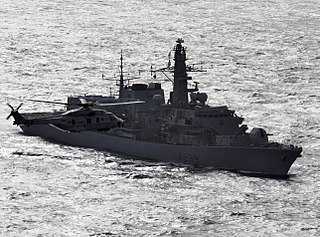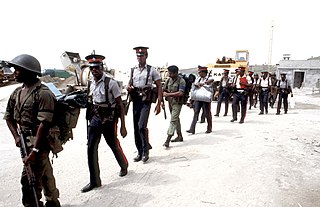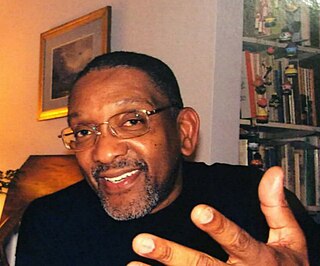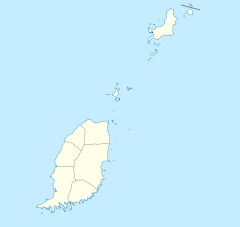The history of Grenada in the Caribbean, part of the Lesser Antilles group of islands, covers a period from the earliest human settlements to the establishment of the contemporary nationstate of Grenada. First settled by indigenous peoples, Grenada by the time of European contact was inhabited by the Caribs. French colonists killed most of the Caribs on the island and established plantations on the island, eventually importing African slaves to work on the sugar plantations.

The United States invasion of Grenada began at dawn on 25 October 1983. The United States and a coalition of six Caribbean nations invaded the island nation of Grenada, 100 miles (160 km) north of Venezuela. Codenamed Operation Urgent Fury by the U.S. military, it resulted in military occupation within a few days. It was triggered by the strife within the People's Revolutionary Government, which resulted in the house arrest and execution of the previous leader and second Prime Minister of Grenada, Maurice Bishop, and the establishment of the Revolutionary Military Council, with Hudson Austin as chairman. The invasion resulted in the appointment of an interim government, followed by elections in 1984.
Maurice Rupert Bishop was a Grenadian revolutionary and the leader of New Jewel Movement – a Marxist–Leninist party that sought to prioritise socio-economic development, education, and black liberation – that came to power during the 13 March 1979 revolution that removed Eric Gairy from office. Bishop headed the People's Revolutionary Government of Grenada from 1979 to 1983, when he was dismissed from his post and executed during the coup by Bernard Coard, leading to upheaval.

HMS Richmond is a Type 23 frigate of the Royal Navy. She was launched on 6 April 1993 by Lady Hill-Norton, wife of the late Admiral of the Fleet The Lord Hill-Norton, and was the last warship to be built by Swan Hunter Shipbuilders. She sailed from the builders on the River Tyne in November 1994. She is named for the Dukedom of Richmond.

USS Guam (LPH-9), was an Iwo Jima-class amphibious assault ship, and was laid down by the Philadelphia Naval Shipyard on 15 November 1962; launched on 22 August 1964, sponsored by Mrs. Vaughn H. Emory Green, and commissioned on 16 January 1965. She was the third US Navy ship to carry the name, after the US Territory of Guam.
Winston Bernard Coard is a Grenadian politician who was Deputy Prime Minister in the People's Revolutionary Government of the New Jewel Movement. Coard launched a coup within the revolutionary government and took power for three days until he was himself deposed by General Hudson Austin.

The New Joint Endeavor for Welfare, Education, and Liberation, or New JEWEL Movement (NJM), was a Marxist–Leninist vanguard party in the Caribbean island nation of Grenada that was led by Maurice Bishop.

Prisoner abuse is the mistreatment of persons while they are under arrest or incarcerated. Prisoner abuse can include physical abuse, psychological abuse, sexual abuse, torture, or other acts such as refusal of essential medication, and it can be perpetuated by either fellow inmates or prison faculty.

The Boeing MH-6M Little Bird and its attack variant, the AH-6, are light helicopters used for special operations in the United States Army. Originally based on a modified OH-6A, it was later based on the MD 500E, with a single five-bladed main rotor. The newest version, the MH-6M, is based on the MD 530F and has a single, six-bladed main rotor and four-bladed tail rotor.

Korydallos Prison Complex is Greece's largest jail and contains the country's main maximum-security prison, housing both maximum-security men and women. It is located in Korydallos, Piraeus. Famous detainees include members of the anarchist urban guerrilla organizations Revolutionary Organization 17 November, Revolutionary Struggle and Conspiracy of Fire Nuclei. Korydallos prison was also used as the place for the Greek junta trials in 1975, and contains a special court in its basement.

His Majesty's Prisons is the name given to prisons in the United Kingdom, as well as some in Australia and a small number in Canada, Grenada, Jersey, The Bahamas and Barbados. The title makes up part of the name of individual prisons and is usually abbreviated to HM Prison or HMP.
Human rights in Egypt are guaranteed by the Constitution of the Arab Republic of Egypt under the various articles of Chapter 3. The country is also a party to numerous international human rights treaties, including the International Covenant on Civil and Political Rights and the International Covenant on Economic, Social and Cultural Rights. However, the state of human rights in the country has been criticized both in the past and the present, especially by foreign human rights organisations such as Amnesty International and Human Rights Watch. As of 2022, Human Rights Watch has declared that Egypt's human rights crises under the government of President Abdel Fattah al-Sisi, is "one of its worst ... in many decades", and that "tens of thousands of government critics, including journalists, peaceful activists, and human rights defenders, remain imprisoned on abusive 'terrorism' charges, many in lengthy pretrial detention." International human rights organizations, such as the aforementioned HRW and Amnesty International, have alleged that as of January 2020, there are some 60,000 political prisoners in Egypt. Other complaints made are of authorities harassing and detaining "relatives of dissidents abroad" and use of "vague 'morality' charges to prosecute LGBT people, female social media influencers, and survivors of sexual violence". The Egyptian government has frequently rejected such criticism, denying that any of the prisoners it holds are political prisoners.
The Grenada 17 were the seventeen political, military and civilian figures convicted of various crimes associated with the 1983 overthrow of Maurice Bishop's government of Grenada and his subsequent murder.

Grenada is an island country in the West Indies in the Caribbean Sea at the southern end of the Grenadines island chain. Grenada consists of the island of Grenada itself, two smaller islands, Carriacou and Petite Martinique, and several small islands which lie to the north of the main island and are a part of the Grenadines. It is located northwest of Trinidad and Tobago, northeast of Venezuela and southwest of Saint Vincent and the Grenadines. Its size is 348.5 square kilometres (134.6 sq mi), and it had an estimated population of 124,523 in July 2021. Its capital is St. George's. Grenada is also known as the "Island of Spice" due to its production of nutmeg and mace crops.

The Caribbean Peace Force (CPF), also known as the Caribbean Peacekeeping Force and the Eastern Caribbean Peace Force (ECPF), was a 350-member peacekeeping force operating in Grenada from October 1983 to June 1985 after the Invasion of Grenada, codenamed Operation Urgent Fury. The military intervention by the United States of America in coalition with six Caribbean nations was in response to the illegal deposition and execution of Grenadan Prime Minister Maurice Bishop on Oct. 19, 1983. Bishop's revolutionary regime was briefly replaced by a military junta composed entirely of Grenadian military officers. On October 25, 1983, the United States, Barbados, Jamaica and members of the Organisation of Eastern Caribbean States landed on Grenada, defeated Grenadian and Cuban resistance and overthrew the military government of Hudson Austin.

The People’s Revolutionary Army (PRA) was the military of Grenada between 1979 and 1983.
Caribbean Labour Solidarity (CLS), founded in 1974, is a group that "sets itself the task of informing the concerned about labour issues in the (Caribbean) region as a whole", and "continues to support the national and anti-imperialist fight in the West Indies", as well as being an international campaigning organisation. A 1980 CLS publication states: "Caribbean Labour Solidarity takes as its central concern the need for increased cohesion between the British labour movement and all components of the anti-imperialist and national democratic struggles in the Caribbean."

Franklyn Harvey was a Grenadian academic, activist and professional, a founder of the New Jewel Movement (NJM) and principal author of their manifesto. He had a significant influence on the development of the Caribbean new left throughout the 1960s and 1970s and later, in the animation of hundreds of municipal and community projects all around the world. When the NJM took over the government of Grenada on 13 March 1979, Harvey's contributions to their manifesto began to take concrete form across the island.
Fox Hill Prison is the only prison in the Bahamas. Located in Nassau, the capital, it is operated by the Bahamas Department of Correctional Services. Fox Hill Prison has minimum, medium, and maximum security facilities for male prisoners. It also has one block for female prisoners, as well as a medical block.











